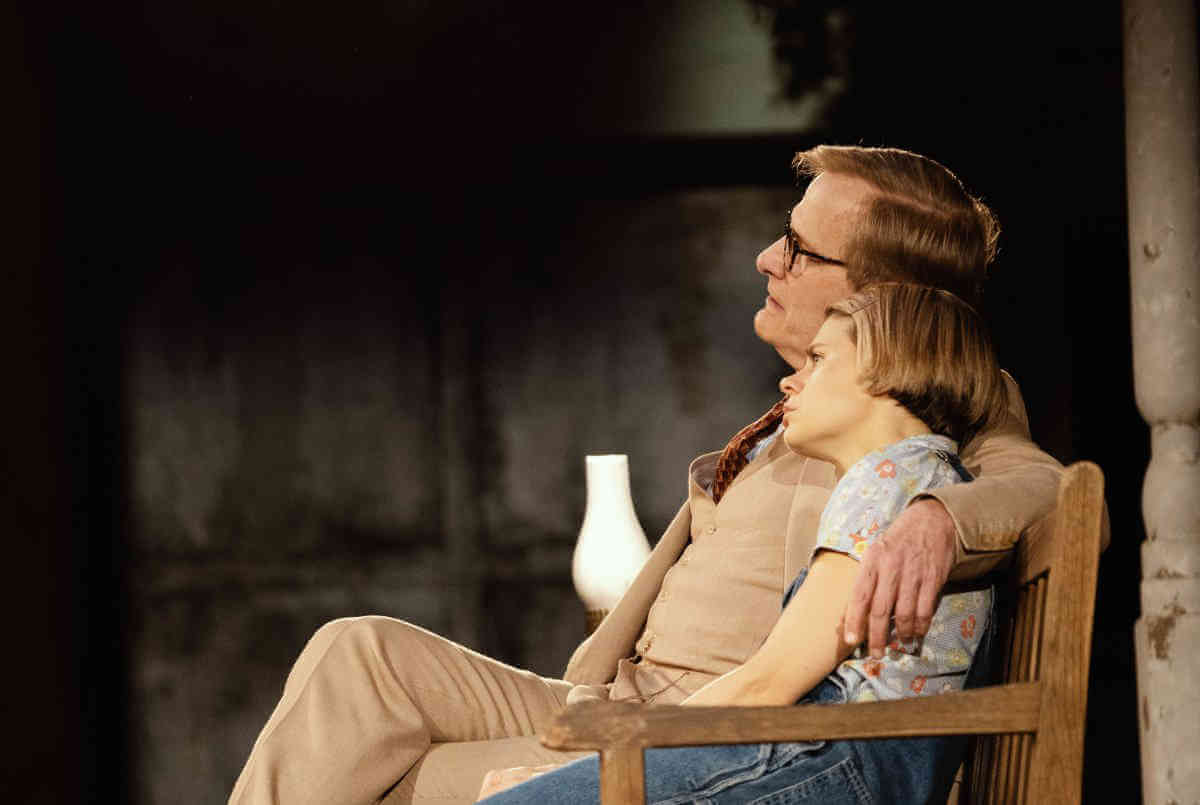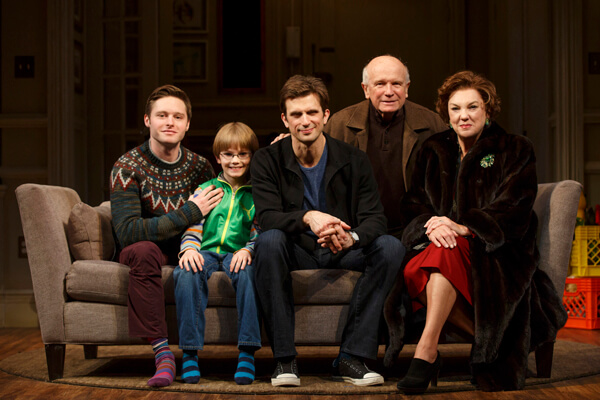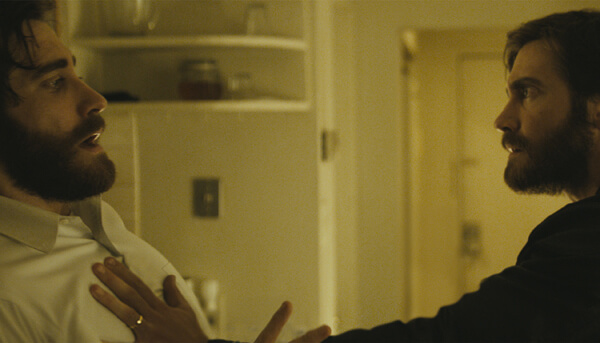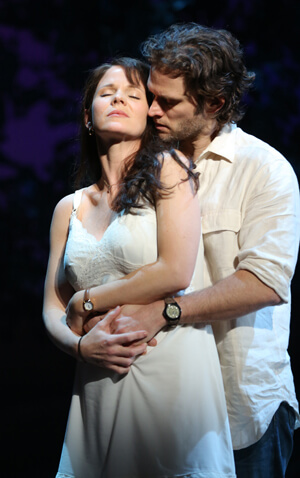Having missed reading “To Kill a Mockingbird” in high school and seeing the movie only once on TV, I went into Aaron Sorkin’s adaptation largely tabula rasa, other than knowing the story’s basic premise. This play is about as exciting as it gets, wonderfully crafted, beautifully staged, and feelingly acted by an extraordinary company gracefully telling the story under the sensitive and deeply felt direction of Bartlett Sher.
The tale of a small, predominantly white town, the fictional Maycomb, Alabama, torn apart in 1934 by the rape trial of a black man, has profound resonance today with racism defiantly paraded. On the stage, the struggle to be good, human, and compassionate is the central conflict as lawyer Atticus Finch defends Tom Robinson primarily because he believes Robinson deserves a defense, even though he’s a black man in Jim Crow America. This puts Atticus at odds with his fellow townspeople.
Sorkin has made the trial the central framing device of the play, and around that we see scenes of the town and the three children, Atticus’ daughter Scout, son Jem, and Dill, a boy visiting for the summer as the trial unfolds. Through the children’s eyes, we see a town that includes klansmen who want to deliver their own brand of justice as well as the virtually illiterate and hate-filled Bob Ewell, whose daughter Mayella claims to have been raped. Throughout the play, a battle rages between rationality and evidence and ignorance and hatred.
The play is a memory, told by Scout who moves in and out of the story, at once commenting as an adult and existing within it as a child. It’s a canny device, and the sense of being in the present while looking back on the past simultaneously plays with time and our own perceptions as children and what we know as adults. It gives the piece a kind of pointed lyricism unique among memory pieces.
The company is consistently outstanding. Jeff Daniels as Atticus gives a nuanced performance of a man who struggles with moral complexity and sometimes falls short of goodness.
I’m not usually a fan of adults playing children, but it works beautifully here. Gideon Glick is exceptional as Dill. His loneliness and need for connection as well as his boyish energy are perfectly calibrated. Will Pullen as Jem is a boy on the cusp of becoming a man, and his frustration with his father and his childish understanding are often at odds. As Scout, Celia Keenan-Bolger is perfection, completely believable in everything she does. Like Jem, she is animated by a sense of unrest and righteous passion. Frederick Weller as Bob Ewell and Erin Wilhelmi as his daughter Mayella give harrowing performances that fearlessly expose the toxic nature of ignorant hatred. LaTanya Richardson Jackson as Atticus’ housekeeper Calpurnia is very strong. I wondered if her forthrightness in addressing her employer as an African-American servant in 1934 Alabama was anachronistic, but the dramatic necessity of what she has to say in a contemporary retelling of this story and Jackson’s fierce and gentle performance serve the play.
Atticus tells Jem it would be a sin to kill a mockingbird, for it would represent the destruction of innocence. It would also be a sin to miss this production.
Two men delivering monologues on a bare stage may just be one of the most theatrically satisfying theater pieces in New York right now. The two plays: “Sea Wall” by Simon Stephens and “A Life” by Nick Payne are on a double bill at the Public’s Newman Theater. Performed by Tom Sturridge and Jake Gyllenhaal, respectively, these are two family stories exquisitely written and meticulously performed under the direction of Carrie Cracknell. The stories are not very elaborate, and that’s the source of their human power. They are about life, death, survival, and change — eternal themes. To say more about their plots would be to give away too much. It is in the discovery and responses to events that the humor and the pathos of each piece resonate.
Certainly one of the things that make the pieces work so well is the stylistic consistency of Sturridge and Gyllenhaal in telling their stories. Their honesty and presence command the space and draw one into the lives of these men and what happens to them. Both are such compelling performers that it is impossible not to feel their experiences, rather than merely watch them. Though the two characters never interact, we are drawn into the commonality of human experience of fathers, sons, joy, and tragedy. It is, as Shakespeare says, “to hold the mirror up to nature” — what we go to the theater for.
As might be expected, the production is largely sold out. The Today Tix app has $20 rush seats on a daily basis, resale seats are available online, and there is a cancellation line at the box office before each performance.
Whatever problems Stephen Sondheim’s and George Furth’s 1981 musical “Merrily We Roll Along” has had over its history, the score has never been one of them. Even for those who have never seen the show, the songs have become cabaret standards, and the overture is, arguably, one of the last great Broadway overtures. It recalls other greats like the one from “Gypsy,” but as “Merrily’”s dark plot unspools — reversing time by beginning with present-day disillusionment and ending in youthful optimism — the overture takes on an ironic meaning as well: the buoyant, brazen, and upbeat music promises a kind of happiness that we learn the characters have lost.
Young when I saw the original production for the first of six times, I thought that, as with the Kaufman and Hart play on which it was based, “Merrily” was a cautionary tale rather than a gloomy, existential treatise on inevitable disappointment. It has always seemed to me that the show was about going back and finding that spark of hope, even as the years have ground on and taken their toll. “Our Time,” the last song in the show and one of the most beautiful in the musical theater canon, is about possibility and the literary intent is to show that possibility only dies when we let it. The fates of the three main characters — Charlie, Frank, and Mary — need not be ours.
It’s particularly disappointing, then, that the score is the most egregious casualty in the Fiasco Theater’s revival of “Merrily” now at Roundabout. The overture is gone, the lush orchestrations have been flattened out, and the company has been reduced to six actors. This could create a level of intimacy, but unfortunately the cast as a whole lacks the ability to sing the score. At the performance I saw, pitch problems were rampant, and at times it was as if they couldn’t hear the band. Jessie Austrian playing Mary, an angry alcoholic, has a big break in the song “Now You Know,” a pivotal plot moment where she tells Frank that life is crummy, but she was consistently flat. And her voice showed strain in her other numbers as well. Similar problems of pushing, placement, and support plagued the singing of Ben Steinfeld as Frank, the “genius” composer turned sell-out Hollywood producer. Manu Narayan as Charlie, Frank’s estranged writing partner, fared slightly better, but the role strained his range and he cracked several times reaching for notes.
Sondheim’s original casts often featured idiosyncratic and unique voices, but they’ve always been able to sing the music, which is, by the way, some of the most complicated musical theater music ever written for singers.
Fiasco has also cut the book way down. The entire piece runs about an hour and 45 minutes with no intermission. The cutting does neither the story nor the characters any favors. It becomes almost completely expository with no nuance or character development. Under Noah Brady’s haphazard direction, which has no apparent sophisticated point of view on the piece, the characters are not disillusioned, they’re just pissed off. That’s not very interesting to watch, and not just because we never know the source of their anger.
There are silly moments, too, like trying to create a crowd with mannequins and skeletons attached to sticks that the secondary characters tote around the stage. Fiasco, which loves that tired cliché of pulling props out of a box in its productions, has here hung them all over the stage. In the end, the production feels like high school effort whose reach is way beyond its grasp. To paraphrase one of the songs, what might have seemed like a good thing going in is just plain gone.
TO KILL A MOCKINGBIRD | Shubert Theatre, 225 W. 44th St. | Tue.-Thu. At 7 p.m.; Fri.-Sat. at 8 p.m.; Wed. at 1 p.m.; Sat. at 2 p.m.; Sun. at 3 p.m. | $39-$199 at telecharge.com or 212-239-6200 | Two hrs., 30 mins., with intermission
SEA WALL/ A LIFE | The Public Theater, 475 Lafayette St., btwn. E. Fourth St. & Astor Pl. | Through Mar. 31: Tue.-Sat. at 8 p.m.; Sat.-Sun. at 2 p.m. | $79-$99 at publictheater.org or 212-967-7555; but best bet is $20 rush tickets daily on Today Tix app; | One hr., 45 mins., no intermission
MERRILY WE ROLL ALONG | Laura Pels Theatre, 111 W. 46th St. | Through Apr. 14: Tue.-Sat. at 7:30 p.m.; Wed., Sat. at 2 p.m.; Sun. at 3 p.m. | $99-$149 at roundabouttheatre.org or 212-719-1300 | One hr., 45 mins., no intermission



































